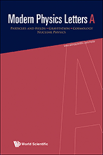
MODERN PHYSICS LETTERS A
metrics 2024
Illuminating the Path of Modern Physics Exploration
Introduction
MODERN PHYSICS LETTERS A, published by World Scientific Publishing Co Pte Ltd, is a distinguished journal in the field of physics that serves as a pivotal platform for researchers, professionals, and students alike. With ISSN 0217-7323 and E-ISSN 1793-6632, the journal has gained international acclaim for its contributions to Astronomy and Astrophysics as well as Nuclear and High Energy Physics. The journal is ranked in Q3 for both Astronomy and Astrophysics and Nuclear and High Energy Physics, showcasing its relevance in these areas, while also achieving a Q2 ranking in the broader category of Physics and Astronomy (miscellaneous). Spanning from 1996 to 2024, MODERN PHYSICS LETTERS A promotes open dialogue and dissemination of pioneering research findings and innovative theories. While the journal operates without an open access option, its rich content is easily accessible through various academic databases, ensuring that vital research is shared widely among the scientific community. Situated in Singapore, this journal plays an essential role in the continuous advancement of the physics discipline, fostering collaboration and knowledge sharing among global researchers.
Metrics 2024
 0.40
0.40 1.50
1.50 1.40
1.40 89
89Metrics History
Rank 2024
Scopus
IF (Web Of Science)
JCI (Web Of Science)
Quartile History
Similar Journals
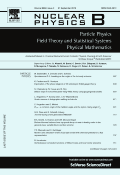
NUCLEAR PHYSICS B
Leading the Charge in Open Access Nuclear ResearchNUCLEAR PHYSICS B, published by Elsevier, stands at the forefront of research in the dynamic field of Nuclear and High Energy Physics. Established in 1967, this prestigious journal has developed a reputation for excellence, now positioned in the Q1 category according to its 2023 quartile rankings. With an impressive Scopus rank of #21 out of 87 in its category and a commendable 76th percentile, it serves as a vital resource for scholars investigating the underlying principles of nuclear interactions and particle physics. The journal transitioned to an Open Access model in 2014, ensuring that groundbreaking research is accessible to a global audience. Its commitment to quality and innovation makes NUCLEAR PHYSICS B an essential platform for researchers, professionals, and students aiming to stay at the cutting edge of discoveries in this expansive field, contributing to the scientific discourse for nearly six decades.
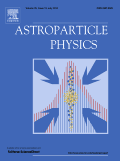
ASTROPARTICLE PHYSICS
Illuminating the Nexus of Astrophysics and ParticlesASTROPARTICLE PHYSICS is a premier international journal dedicated to advancing the understanding of the intersection between particle physics, astronomy, and astrophysics. Published by Elsevier, this journal has established itself as a leading source of research insights since its inception in 1992, with a remarkable impact factor positioning it within the Q1 category for Astronomy and Astrophysics for 2023. With a Scopus ranking of 18 out of 90 in its field, representing the top 80th percentile, ASTROPARTICLE PHYSICS serves as an essential platform for disseminating groundbreaking research that influences astrophysical studies and cosmological theories. Researchers and academics have access to a robust collection of peer-reviewed articles that explore various dimensions of astroparticle phenomena, collaborative cosmic investigations, and theoretical advancements. Although not an open-access journal, it provides extensive research coverage accessible to a global audience from its headquarters in Amsterdam, Netherlands, offering a vital resource for those seeking to push the boundaries of knowledge in the realms of astrophysics and particle physics.

Science China-Physics Mechanics & Astronomy
Empowering Researchers with Cutting-edge InsightsScience China-Physics Mechanics & Astronomy, published by SCIENCE PRESS, stands as a prestigious journal within the Physics and Astronomy domain, particularly recognized for its contributions to the understanding of fundamental and applied physics. With an exhilarating Q1 ranking in the 2023 category and earning a remarkable scopus rank of #21 out of 243, the journal demonstrates its significant impact, being positioned in the 91st percentile of its field. Operating under an Open Access model, it facilitates the broad dissemination of high-quality research, ensuring accessibility for researchers, professionals, and students worldwide. Its scope covers a variety of essential topics in physics and astronomy, promoting a comprehensive understanding of the latest advancements from 2010 through 2024. The journal is a vital resource for anyone aiming to stay at the forefront of research in these dynamic fields, with its prominent address located in Beijing, China, symbolizing its global influence.

Physics of the Dark Universe
Navigating the Unseen Realms of the UniversePhysics of the Dark Universe is a premier academic journal published by Elsevier, dedicated to advancing the understanding of dark matter, dark energy, and their implications for the universe. With its ISSN N/A and E-ISSN 2212-6864, the journal has established a notable presence since its inception in 2012, operating out of Amsterdam, Netherlands. As evidenced by its impressive impact factor and its ranking in the top quartile in both Astronomy and Astrophysics (Q1) and Space and Planetary Science (Q1) categories for 2023, this journal is a vital resource for researchers and practitioners within these fields. In the latest Scopus ranks, it ranks #12 out of 104 in Earth and Planetary Sciences and #13 out of 90 in Physics and Astronomy, placing it in the 88th and 86th percentiles respectively, underlining its academic significance. The journal is not Open Access, yet it plays an essential role in disseminating high-quality research that pushes the boundaries of knowledge about the cosmos and its most enigmatic components. Researchers, professionals, and students interested in the forefront of astrophysics will find this journal an indispensable tool for staying abreast of emerging discoveries and ongoing debates.
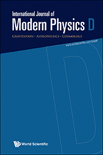
INTERNATIONAL JOURNAL OF MODERN PHYSICS D
Innovating Knowledge in Modern PhysicsWelcome to the INTERNATIONAL JOURNAL OF MODERN PHYSICS D, a premier publication dedicated to the advancement of knowledge in the fields of Astronomy and Astrophysics, Mathematical Physics, and Space and Planetary Science. Published by WORLD SCIENTIFIC PUBL CO PTE LTD in Singapore, the journal boasts an impressive impact, being ranked Q2 in Astronomy and Astrophysics and Mathematical Physics, and Q3 in Space and Planetary Science. With a converged publishing timeline from 1996 to 2024, this journal provides a vital platform for researchers and professionals to disseminate their findings, engage with cutting-edge research, and explore emerging ideas in modern physics. Although it operates under a traditional access model, the rigorous peer-reviewed process ensures that only the highest quality research contributes to the collective understanding of our universe. Join us in advancing the frontiers of physics and astronomy!

PHYSICAL REVIEW LETTERS
Delivering Swift Insights into Fundamental ResearchPhysical Review Letters, published by the American Physical Society, is a premier journal in the field of Physics and Astronomy renowned for its rapid dissemination of high-impact research findings. With a distinguished history dating back to 1958 and an impressive ranking of #13 out of 243 in the general physics category, it stands proudly within the Q1 quartile, placing it in the top 6% of journals in its field. The journal focuses on brief reports of significant fundamental research across all areas of physics, making it an essential resource for researchers, professionals, and students seeking to stay at the forefront of developments in their field. Although Physical Review Letters does not offer open access options, its rigorous peer-review process ensures a high standard of quality and relevance in its published articles. With an unwavering commitment to advancing the understanding of physical science, this journal is indispensable for those looking to make a genuine impact in their research endeavors.
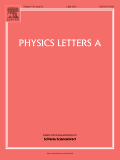
PHYSICS LETTERS A
Fostering Excellence in Scientific InquiryPhysics Letters A is a renowned scientific journal published by Elsevier, dedicated to the field of physics and astronomy. Established in 1963, it has continuously evolved, offering a platform for the swift dissemination of significant research findings in various branches of physics. As of 2023, it holds a commendable Q2 ranking in the category of Physics and Astronomy (miscellaneous) and ranks 69th out of 243 journals in the same domain according to Scopus, positioning itself in the 71st percentile of academic impact. With its comprehensive scope, Physics Letters A provides a vital resource for researchers, professionals, and students, facilitating academic discourse and advancing knowledge across the field. Although it does not currently offer Open Access options, its rigorous peer-review process ensures high-quality content. It is centrally located in Amsterdam, Netherlands, and continues to be an essential outlet for innovative contributions to the physics community through the year 2024 and beyond.

INTERNATIONAL JOURNAL OF MODERN PHYSICS A
Pioneering insights into the fabric of the universe.INTERNATIONAL JOURNAL OF MODERN PHYSICS A, published by WORLD SCIENTIFIC PUBL CO PTE LTD, stands as a pivotal platform in advancing the frontiers of research within the fields of Astronomy and Astrophysics, Atomic and Molecular Physics, and Nuclear and High Energy Physics. Established in 1989, this journal has systematically contributed to the scientific community, with a demonstrated impact as indicated by its Q2 category rankings across these critical disciplines in 2023. Researchers and professionals are encouraged to engage with its rigorous peer-reviewed content, fostering a deeper understanding of modern physics theories and experimental breakthroughs. Although the journal operates under a conventional access model, it remains a vital resource for those seeking to disseminate their findings and stay abreast of cutting-edge developments. With an emphasis on quality and breadth of research, the journal continues to attract submissions from leading physicists and scholars, enhancing its reputation as a key academic resource.
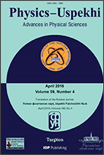
PHYSICS-USPEKHI
Advancing Knowledge in Theoretical and Experimental PhysicsPHYSICS-USPEKHI, published by Uspekhi Fizicheskikh Nauk, is a prominent peer-reviewed journal in the field of physics and astronomy, reaching researchers and professionals since its inception in 1993. With an ISSN of 1063-7869 and an E-ISSN of 1468-4780, this esteemed journal has been classified as Q2 in the Physics and Astronomy category based on the 2023 quartiles, ranking 74 out of 243 journals in its Scopus classification, placing it in the 69th percentile. Although currently not an open access journal, it provides invaluable insights and advancements in the field, fostering an environment for scholarly exchange and collaborative research. Based in Moscow, Russia, PHYSICS-USPEKHI continues to shape the landscape of theoretical and experimental physics, inviting submissions that contribute to its rich legacy of high-impact scientific discourse.
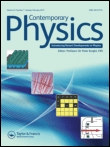
CONTEMPORARY PHYSICS
Bridging Theory and Application in Modern PhysicsCONTEMPORARY PHYSICS, published by Taylor & Francis Ltd, stands as a notable journal in the field of physics and astronomy, offering a comprehensive platform for the dissemination of cutting-edge research and developments since its inception in 1959. With an Impact Factor that reflects its solid position within the academic community, as evidenced by its Q2 ranking in the 2023 category of Physics and Astronomy (miscellaneous) and a Scopus Rank of 111 out of 243, this journal plays an essential role in bridging theoretical advances and practical applications. Researchers and professionals are encouraged to explore its diverse scope, which aims to foster innovative ideas and foster interdisciplinary collaboration. Although not currently an open access journal, CONTEMPORARY PHYSICS is committed to maintaining the highest standards of editorial excellence and provides valuable insights across converged eras of research from 1959 to 2024, making it indispensable for those dedicated to advancing their knowledge and contributions in the realm of physics.